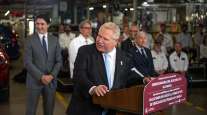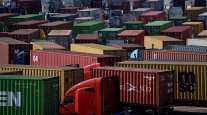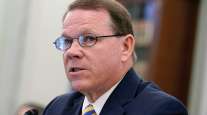US Recession May Come Just in Time for Trump’s Re-Election Bid

Here’s another reason to circle the 2020 election year on the calendar. It may well be the year of the next U.S. recession.
Hefty tax cuts, stepped-up government spending and robust global growth should help insulate the economy against a downturn over the next two years, in spite of last week’s stock-market swoon. That would allow the expansion that began in 2009 to become America’s longest ever.
But after that, watch out, economists warn. Fading fiscal stimulus, higher and rising interest rates, and cresting world demand could leave the economy vulnerable to a contraction — just in time for the presidential campaign.
RELATED: Former treasury secretary warns next recession could outlast previous one
“2020 is a real inflection point,” said Mark Zandi, chief economist at Moody’s Analytics Inc., in West Chester, Penn.
It’s not only President Donald Trump who needs to worry after claiming his policies of deregulation, deficit-widening fiscal measures and trade protectionism will lift the world’s largest economy out of a decade of mediocre growth. Investors should fret, too. A recession — or more accurately, the anticipation of one — is often the trigger for bear markets in stocks.
Economy watchers admit they don’t have a great track record predicting downturns. Forecasting a recession in 2020 is a “mug’s game,” given all the uncertainties involved, said Krishna Guha, vice chairman at Evercore ISI in Washington.
RELATED: Trump slaps tariffs on $50 billion worth of Chinese goods
But what seems clear is this: The fiscal sugar rush that’s ginning up growth in the short run could be setting the stage for a letdown later, especially if the Federal Reserve feels compelled to take away the punch bowl before inflation and asset prices like stocks get too out of hand.
What Bloomberg Economists Say
The economy is poised for a bumpy ride in 2020, and if enough policy mistakes pile up — overly restrictive fiscal policy and excessively tight monetary policy — this could certainly create sufficient downdrafts to create a recession, or at the very least, a growth recession. Political uncertainty could also prove highly disruptive to “animal spirits” and economic confidence.
— Carl Riccadonna and Yelena Shulyatyeva, Bloomberg Economics
“I’m very comfortable about this year and I feel pretty good about 2019, too,” said Joel Prakken, chief U.S. economist at Macroeconomic Advisers by IHS Markit. After that, “my anxiety level starts to rise.”
That doesn’t preclude some sort of geopolitical shock or policy misstep ending the 105-month-old expansion before then, of course. Trump’s ratcheting-up of trade tensions sent stocks tumbling last week on fears it would hit the global economy, even though economists don’t see the latest actions leading to a recession.
“You can be a totally healthy person and a block falls off a building and kills you,” said Allen Sinai, president of Decision Economics Inc. in New York.
Solid Shape
Barring that, though, the economy looks to be in solid shape for now. Sinai ticked off some of the pluses: financially healthy households, rising corporate profits and solid global growth. Interest rates are still low and financial conditions easy. Then Trump and Congress “threw gasoline” on top of all that with tax cuts and spending increases, said Timothy Adams, president of the Washington-based Institute of International Finance.
The trouble is that some of that fuel — the $300 billion boost to government expenditures — is slated to burn off after two years under the budget agreement passed by Congress. That’s led some economists to talk of a fiscal cliff in 2020 with falling outlays dragging down the economy.
The betting, though, is that lawmakers will act to prevent that. But even if they do, they’re unlikely to throw more accelerant on the economy. So the budgetary boost to growth will shrink from a half percentage point this year to a quarter point next year to basically a wash in 2020, said Michael Feroli, chief U.S. economist at JPMorgan Chase & Co. in New York.
In the meantime, the super-charged spending raises the risk of overheating the economy by pushing unemployment further below its long-run sustainable level and leading, at last, to a pick-up in wages and inflation. And that, in turn, increases the chances that the Fed will overreact by jacking up interest rates, tipping the U.S. into recession.
Monetary policy makers already see themselves as actively attempting to slow the economy in 2020, based on projections released last week. They expect to push the interbank federal funds rate to 3.4% at the end of 2020, from its current range of 1.5 to 1.75% and above the 2.9% level they consider neutral for the economy, based on their median forecast.
‘Modestly Restrictive’
Fed Chairman Jerome Powell last week played down the significance of the 2020 rate projections, saying officials “don’t have the ability to see that far into the future.”
But he acknowledged that they showed policy turning “modestly restrictive.”
“When policy becomes restrictive, that’s usually the time when a recession starts to appear on the horizon,” said Joachim Fels, global economic adviser at Pacific Investment Management Co.
Evercore’s Guha raised the prospect of a “train wreck” in 2020 as Fed efforts to prevent overheating lead to rates that are too high for an economy suffering from the end of the fiscal sugar rush and an ebbing of global growth.
To be sure, the expansion could be extended if Trump’s tax cuts spur more corporate investment and higher productivity, or the tight jobs market entices more Americans off the sidelines and into the labor force. Either of those developments would lower the danger of an inflation over-boil.
There’s also scant sign — at least so far — of the sort of excesses that precede a recession. Consumer and corporate borrowing has risen, though not to levels deemed dangerous. Banks are in good shape, with plenty of capital and liquidity.
One potential warning flag: stock and other asset prices that remain elevated even after last week’s selloff. As Powell himself has noted, it wasn’t faster inflation that led to the last two recessions. It was a bursting of asset bubbles.
Spurred by rising equity and property prices, household net worth as a percentage of disposable personal income has topped the highs seen before the past two economic downturns.
“Many folks are reluctant to time a recession call,” said Peter Hooper, chief economist for Deutsche Bank Securities in New York.
That said, he sees growth slowing significantly over the next three years, from 2.9% in 2018 to 2.5% next year to 1.5% in 2020, which would be the slowest since 2012.
“It’s going to take some real good policy making and some luck to avoid a recession in 2020,” Zandi said.




